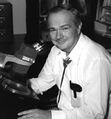Template:Selected anniversaries/July 18: Difference between revisions
Jump to navigation
Jump to search
No edit summary |
No edit summary |
||
| Line 1: | Line 1: | ||
<gallery> | <gallery> | ||
File:Ludolf van Ceulen.jpg|link=Ludolph van Ceulen (nonfiction)|1562: Mathematician and fencer [[Ludolph van Ceulen (nonfiction)|Ludolph van Ceulen]] demonstrates new class of [[Gnomon algorithm functions]] which detect and prevent [[crimes against mathematical constants]]. | |File:Ludolf van Ceulen.jpg|link=Ludolph van Ceulen (nonfiction)|1562: Mathematician and fencer [[Ludolph van Ceulen (nonfiction)|Ludolph van Ceulen]] demonstrates new class of [[Gnomon algorithm functions]] which detect and prevent [[crimes against mathematical constants]]. | ||
|| | ||1853 – Hendrik Lorentz, Dutch physicist and academic, Nobel Prize laureate (d. 1928) | ||
Hendrik_Antoon_Lorentz.jpg|link=Hendrik Lorentz (nonfiction)|1853: Physicist and academic [[Hendrik Lorentz (nonfiction)|Hendrik Lorentz]] born. He will share the 1902 Nobel Prize in Physics with Pieter Zeeman for the discovery and theoretical explanation of the Zeeman effect. | Hendrik_Antoon_Lorentz.jpg|link=Hendrik Lorentz (nonfiction)|1853: Physicist and academic [[Hendrik Lorentz (nonfiction)|Hendrik Lorentz]] born. He will share the 1902 Nobel Prize in Physics with Pieter Zeeman for the discovery and theoretical explanation of the Zeeman effect. | ||
||1908 – Beatrice Aitchison, American mathematician, statistician, and transportation economist (d. 1997) | |||
||1914 – The U.S. Congress forms the Aviation Section, U.S. Signal Corps, giving official status to aircraft within the U.S. Army for the first time. | |||
||1922 – Thomas Kuhn, American physicist, historian, and philosopher (d. 1996) | |||
||1937 – Hunter S. Thompson, American journalist and author (d. 2005) | |||
||1942 – The Germans test fly the Messerschmitt Me 262 using its jet engines for the first time. | |||
File:Ralph Hartley.jpg|link=Ralph Hartley (nonfiction)|1960: Electronics researcher [[Ralph Hartley (nonfiction)|Ralph Hartley]] publishes new class of [[Gnomon algorithm functions]] with a wide range of applications in electronic devices used to fight [[crimes against mathematical constants]]. | File:Ralph Hartley.jpg|link=Ralph Hartley (nonfiction)|1960: Electronics researcher [[Ralph Hartley (nonfiction)|Ralph Hartley]] publishes new class of [[Gnomon algorithm functions]] with a wide range of applications in electronic devices used to fight [[crimes against mathematical constants]]. | ||
||1966 – Human spaceflight: Gemini 10 is launched from Cape Kennedy on a 70-hour mission that includes docking with an orbiting Agena target vehicle. | |||
||1987 – Gilberto Freyre, Brazilian sociologist, anthropologist, historian, writer, painter, journalist and congressman (b. 1907) | |||
File:Eugene Shoemaker.jpg|link=Eugene Merle Shoemaker (nonfiction)|1997: Geologist and astronomer [[Eugene Merle Shoemaker (nonfiction)|Eugene Merle Shoemaker]] dies. Shoemaker was the first scientist to conclude that Barringer Meteor Crater in Arizona, and similar craters, were caused by meteor impact. | File:Eugene Shoemaker.jpg|link=Eugene Merle Shoemaker (nonfiction)|1997: Geologist and astronomer [[Eugene Merle Shoemaker (nonfiction)|Eugene Merle Shoemaker]] dies. Shoemaker was the first scientist to conclude that Barringer Meteor Crater in Arizona, and similar craters, were caused by meteor impact. | ||
Revision as of 12:06, 15 July 2017
1853: Physicist and academic Hendrik Lorentz born. He will share the 1902 Nobel Prize in Physics with Pieter Zeeman for the discovery and theoretical explanation of the Zeeman effect.
1960: Electronics researcher Ralph Hartley publishes new class of Gnomon algorithm functions with a wide range of applications in electronic devices used to fight crimes against mathematical constants.
1997: Geologist and astronomer Eugene Merle Shoemaker dies. Shoemaker was the first scientist to conclude that Barringer Meteor Crater in Arizona, and similar craters, were caused by meteor impact.
1998: Engineer and alleged time-traveller Henrietta Bolt tells reporters that "time-travel is more work than you might think."



